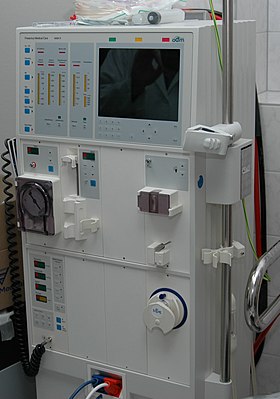
Back ديال دموي Arabic Hemodializ AZ Гемадыяліз BE Крывячышчаньне BE-X-OLD Хемодиализа Bulgarian Cuci darah BJN হিমোডায়ালিসিস Bengali/Bangla Hemodijaliza BS Hemodiàlisi Catalan Hemodialýza Czech
| Hemodialysis | |
|---|---|
 Hemodialysis machine | |
| Other names | kidney dialysis |
| Specialty | Nephrology |
Hemodialysis, also spelled haemodialysis, or simply dialysis, is a process of filtering the blood of a person whose kidneys are not working normally. This type of dialysis achieves the extracorporeal removal of waste products such as creatinine and urea and free water from the blood when the kidneys are in a state of kidney failure. Hemodialysis is one of three renal replacement therapies (the other two being kidney transplant and peritoneal dialysis). An alternative method for extracorporeal separation of blood components such as plasma or cells is apheresis.
Hemodialysis can be an outpatient or inpatient therapy. Routine hemodialysis is conducted in a dialysis outpatient facility, either a purpose-built room in a hospital or a dedicated, stand-alone clinic. Less frequently hemodialysis is done at home. Dialysis treatments in a clinic are initiated and managed by specialized staff made up of nurses and technicians; dialysis treatments at home can be self-initiated and managed or done jointly with the assistance of a trained helper who is usually a family member.[1]
- ^ "Kidney Failure: Choosing a Treatment That's Right for You". National Kidney and Urologic Diseases Information Clearinghouse guidance. Archived from the original on 2010-09-16.